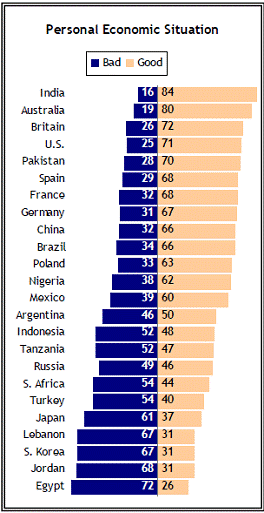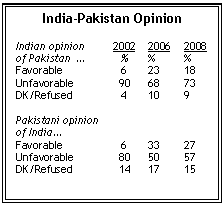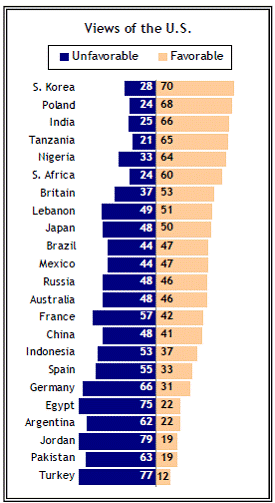[Wednesday night]
Recent reports from the Pew Global Attitudes Project show Indians to be very positive about their economic situation. India is clearly embracing the economic aspects of globalization, with high levels of support for international trade. However, the Indian public also worries greatly about terrorism — more so, in fact, than do Palestinians and as much as Israelis. And, reflecting its longstanding conflict with Pakistan, has a particularly negative view of that neighboring country, which is being blamed by some Indian officials for last week’s attacks.
Economic Optimism

While most countries described their current economic condition as bad in a Pew Global Attitudes Project survey conducted in the spring of this year, six-in-ten Indians (62%) described their country’s situation as good. (It should be noted that samples of the Indian population are disproportionately urban in all percentages cited in this report.) While this percentage is down from 2007, when 74% of Indians described their nation’s economic situation as good, only in China and Australia did a higher percentage of citizens give a positive rating to their national economic condition.
Indians are very optimistic about their economic future, with a 55% majority saying the nation’s financial situation will improve and only 16% saying it will worsen. However, these numbers, like all other opinions reported in this year’s survey, were recorded before the on-going global financial crisis.
Indians are also highly positive about their own finances. Fully 84% of Indians rate their personal economic situation as good, the highest percentage in any of the 24 countries surveyed in 2008.
The Indian public clearly embraces the economic aspects of globalization. Indians are very pro-trade, with nine-in-ten saying trade between countries is very or somewhat good. Moreover, fully 59% see the acquisiton of domestic companies by foreigners as a good thing, the highest percentage of any country surveyed.
Global Fears
Positive opinions about their economy do not, however, equate to national satisfaction. A 58% majority of Indians are dissatisfied with the way things are going in their country today. Only 41% are satisfied.
One reason may be that while Indians see success and opportunity in financial matters, they also see numerous problems facing their country. In the 2007 survey, about seven-in-ten Indians cited crime, corrupt leaders, illegal drugs, AIDS and disease, pollution and terrorism as very big problems facing their country. While many countries had larger percentages citing specific problems, few had so many citizens cite so many problems as “very big problems.”
With regard to terrorism, fully 72% of Indians said it is a very big problem in their country. While a few of the 47 countries surveyed in 2007 had a higher percentage of their public cite terrorism as a major problem, more Indians see terrorism as a very big problem than do Palestinians (51%) and as many cite it as the Israelis (70%).
Furthermore, 55% of Indians list “conflict” as a very big problem facing their country, one of the highest percentages recorded in any of the 47 countries surveyed last year. One of the few countries with more citizens listing conflict as a problem was India’s neighbor, and often adversary, Pakistan (63%). Long-standing tensions between the two countries are evident in each public’s perception of the other country.

In the 2008 survey, fully 73% of Indians had an unfavorable opinion of Pakistan (53% very unfavorable), while only 18% had a favorable opinion. For their part, 57% of Pakistanis had an unfavorable opinion of India, with only 27% having a favorable opinion. While India has the most negative opinion of Pakistan of any of the 24 countries surveyed, and vice-versa, the negativity on both sides had declined since 2002, when fully 90% of Indians had an unfavorable view of Pakistan and 80% of Pakistanis had an unfavorable view of India.
Although only 16% of Indians cited religious and ethnic hatred as one of the greatest threats to the world in the 2007 survey, antipathy towards Muslims has risen recently inside the predominantly-Hindu country. In 2008, India was notably the one country outside of the West to see increases in unfavorable opinions towards Muslims. A clear majority (56%) now voices a negative opinion, up from 51% in 2006 and 43% in 2005.
Mixed Opinion of American Influence
India is one of the few countries surveyed in 2008 to believe that efforts to establish a stable democratic government in Iraq will be successful. However, its views of U.S.-led interventions in Afghanistan are far less supportive. Four-in-ten Indians want U.S. and NATO forces stationed in Afghanistan to be removed as soon as possible; only 33% believe troops should stay until the situation has stabilized. However, Indian support for a continuing military presence in Afghanistan is considerably stronger than in countries in South America and the Middle East where opinion is overwhelmingly in favor of removing troops as soon as possible.
In the 2007 survey, roughly half said they support the U.S.-led efforts to fight terrorism, the highest level of support from any Asian country surveyed, and higher than in any Western European country. A third (32%) said the U.S. spreads democracy wherever it can, again the highest percentage in any Asian country and even higher than in the U.S. (30%). However, a majority of Indians said that the U.S. promotes democracy mostly where it serves its own interests. Again, while negative, these views are still relatively pro-American compared with those prevailing in many other countries.

India is one of only three countries out of 24 surveyed in 2008 where a majority believes in the ultimate success of democracy in Iraq, with 56% saying it will definitely or probably succeed. By contrast, in the spring survey, a 53%-majority of Americans believed efforts in Iraq would fail.
Also, unlike many countries, India has not experienced a precipitous drop in favorable opinions of the U.S. since 2002. In the 2008 survey, two-thirds of Indians had a favorable view of America (66%), exactly the same percentage expressing a favorable opinion six years ago.
Indians are not positive about all aspects of America. By a 62%-to-29% margin, Indians said it’s bad that American ideas and customs are spreading to their country. Also, about half (49%) said they dislike American ideas about democracy.
One American sector they applaud: business. In the 2007 survey, a 51% majority of Indians said they like American ways of doing business, while 38% disliked them. In 2008, India was one of only two nations surveyed where more than a third of respondents expressed a positive view of America’s economic influence.




